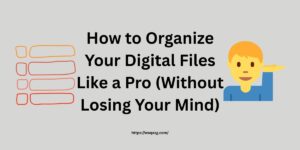
Mastering Time Management Through Technology: How to Achieve Academic Excellence
Originally published in August 18, 2019. Last updated on April 15, 2025
In the modern educational landscape, achieving excellent grades is often viewed as a combination of intelligence and hard work. However, one essential component that frequently gets overlooked is effective time management. With today’s technological tools, students have unprecedented opportunities to manage their time efficiently, optimize their studies, and reach their full academic potential.
This article explores why time management is crucial for students and how technology can play a pivotal role in transforming study habits, achieving exceptional academic results, and cultivating healthy, productive routines.
Why Time Management Matters in Student Life
Every student aims to excel academically, yet many overlook the importance of structured time management. Good time management is the key to balancing study, leisure, and personal growth. Without an organized timetable or clear objectives, even the most intelligent students can struggle academically. Simply put, mastering your schedule can dramatically enhance your ability to learn, retain information, and perform well on exams.
Time management isn’t just about working harder—it’s about working smarter. By prioritizing tasks, setting clear goals, and following a strategic schedule, students can not only achieve better grades but also reduce stress, increase motivation, and enhance overall well-being.
Leveraging Technology for Effective Time Management
Technology is rapidly transforming every aspect of our lives, and education is no exception. Today, numerous digital tools, apps, and online resources make managing time easier than ever before. By effectively using these technological solutions, students can enhance their study sessions, improve productivity, and track their academic progress with precision.
1. Digital Calendars and Scheduling Apps
Gone are the days of paper planners and physical calendars. Digital calendar apps like Google Calendar, Microsoft Outlook, or Apple’s iCalendar offer powerful and user-friendly tools to organize your daily, weekly, and monthly schedules efficiently. These applications allow students to:
- Set reminders for study sessions and assignment deadlines.
- Track important academic events and examination dates.
- Create recurring events to reinforce consistent study habits.
- Share calendars to collaborate on group projects or study groups.
Integrating a digital calendar into your routine ensures you never miss an important task or deadline again, promoting punctuality and consistency in your studies.
2. Task Management Tools
Task management tools such as Todoist, Trello, or Microsoft To-Do help students break their studies into manageable segments. Students can set clear objectives, prioritize tasks based on importance and deadlines, and track their daily progress. These tools provide:
- Clear visual indicators of pending and completed tasks.
- Easy categorization of subjects, topics, or chapters.
- Built-in reminders and notifications to keep your studies on track.
Using these tools, students can avoid procrastination, maintain clarity about what needs to be accomplished, and build positive, productive habits.
Creating a Smart Study Routine
A disciplined routine is central to effective learning. Without consistency, students often find themselves cramming at the last minute, which rarely yields lasting academic success. To avoid burnout and stress, create a structured timetable that includes regular, dedicated study periods balanced with time for rest and recreation.
Setting Achievable Goals with Technology
Goals form the backbone of any productive study routine. Modern educational technology can help students set achievable daily, weekly, and monthly objectives. Tools like Evernote, Notion, or Google Keep allow you to document and track your progress, reflect on your goals, and adjust your study plans accordingly.
For example, you could set daily goals such as:
- “Complete the first chapter of Geography today.”
- “Practice Algebra questions from past exam papers.”
Writing down clear, measurable goals digitally allows for easy adjustments and continuous motivation. This process also prevents either underestimating or overestimating your capabilities.
Balance and Realism: Avoiding the Pitfalls of Over and Underestimation
One common challenge among students is accurately assessing their own abilities. Overestimating your skills can lead to complacency, arrogance, and, ultimately, poor academic performance. Conversely, underestimating your capabilities can result in unnecessary stress, anxiety, and lowered self-confidence.
Technology can help balance this by providing real-time feedback and performance tracking through various educational apps. For example, apps like Forest, Study Bunny, or Pomodoro timers can help students realistically gauge how much work they can complete in a given timeframe.
Smart Studying and Using Technology to Master Your Syllabus
Studying smart, rather than merely studying hard, is essential for long-term academic success. Smart studying involves understanding precisely what’s expected, preparing strategically, and efficiently using your available resources.
1. Utilizing Digital Learning Platforms
Platforms like Khan Academy, Coursera, or Udemy can supplement your formal education. These platforms offer structured courses aligned with your syllabus, enhancing comprehension and filling potential knowledge gaps. By leveraging these resources, students gain deeper insights, strengthen fundamental concepts, and significantly improve academic outcomes.
2. Tracking Progress with Analytics
Many online learning platforms provide analytics to track student performance, helping pinpoint strengths and weaknesses. By identifying areas that need improvement early on, students can allocate study time more effectively, ensuring comprehensive coverage of the syllabus before exams.
The Power of Assessment and Exam Preparation
Effective learning doesn’t end with reading or attending lectures—it includes regular self-assessment to gauge comprehension. Technology provides numerous avenues for self-assessment, allowing students to continually evaluate their preparedness for exams.
Learning from Past Papers and Mock Exams
Practicing past exam papers remains one of the most effective preparation strategies. Today, these resources are widely available online. Websites, forums, and educational databases offer past exam papers, marking schemes, and expert feedback.
Technology-enhanced mock exams simulate real test conditions, allowing students to become comfortable with the exam format, manage time efficiently, and identify areas needing additional practice. Apps like Quizlet or Anki can further enhance this process through flashcards, interactive quizzes, and spaced repetition, solidifying your memory and understanding.

Stay Motivated: Embrace Positivity Through Technology
Maintaining a positive outlook is crucial for academic success. Technology can help cultivate optimism and motivation. Inspirational content, productivity podcasts, and motivational channels on platforms like YouTube offer valuable advice on maintaining resilience and positivity throughout the academic journey.
Moreover, apps like Headspace or Calm can help manage stress and improve mental clarity, directly contributing to improved academic performance.
Conclusion: Transform Your Academic Life with Effective Time Management
In conclusion, mastering time management with the help of technology is essential for students aiming to achieve outstanding academic results. By adopting digital tools to structure your routine, set realistic goals, track progress, and prepare efficiently for exams, you significantly enhance your ability to succeed academically.
Technological advancements provide unprecedented opportunities for students to learn smarter, stay motivated, and remain productive. The power to achieve academic excellence is literally at your fingertips—utilize technology wisely and consistently, and you’re bound to achieve your educational aspirations.
As you harness these resources effectively, remember that the ultimate goal of time management is not just achieving high grades but creating a balanced, fulfilling, and successful student life.
With a structured approach to technology and time management, every student can unlock their fullest potential.




No comment yet, add your voice below!